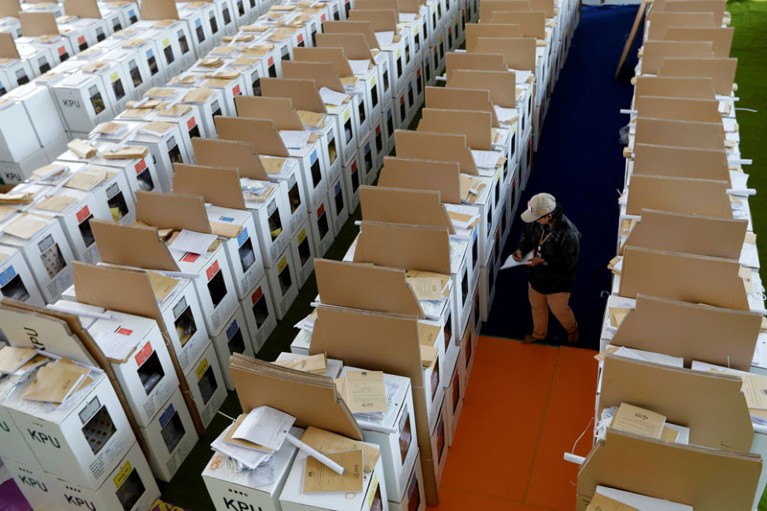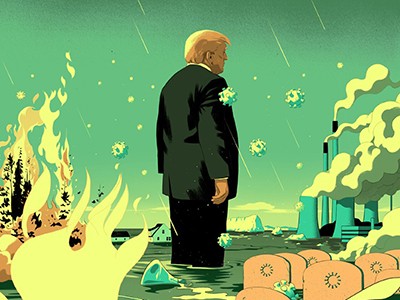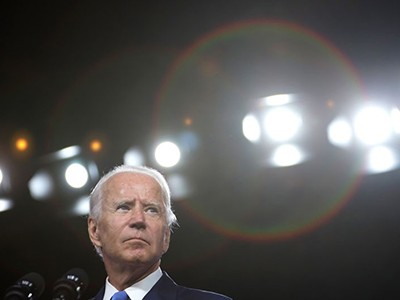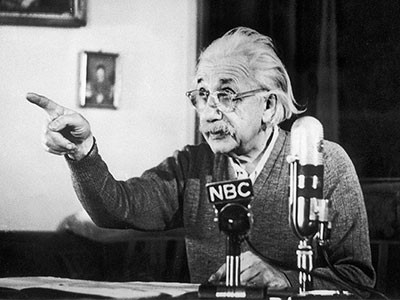
An official prepares ballot boxes for Indonesia’s 2019 election.Credit: Willy Kurniawan/Reuters
Since Nature’s earliest issues, we have been publishing news, commentary and primary research on science and politics. But why does a journal of science need to cover politics? It’s an important question that readers often ask.
This week, Nature reporters outline what the impact on science might be if Joe Biden wins the US presidential election on 3 November, and chronicle President Donald Trump’s troubled legacy for science. We plan to increase politics coverage from around the world, and to publish more primary research in political science and related fields.
Science and politics have always depended on each other. The decisions and actions of politicians affect research funding and research-policy priorities. At the same time, science and research inform and shape a spectrum of public policies, from environmental protection to data ethics. The actions of politicians affect the higher-education environment, too. They can ensure that academic freedom is upheld, and commit institutions to work harder to protect equality, diversity and inclusion, and to give more space to voices from previously marginalized communities. However, politicians also have the power to pass laws that do the opposite.
How Trump damaged science — and why it could take decades to recover
The coronavirus pandemic, which has taken more than one million lives so far, has propelled the science–politics relationship into the public arena as never before, and highlighted some serious problems. COVID-related research is being produced at a rate unprecedented for an infectious disease, and there is, rightly, intense worldwide interest in how political leaders are using science to guide their decisions — and how some are misunderstanding, misusing or suppressing it. And there is much interest in the fluctuating relationship between politicians and the scientists who governments consult or employ.
Scholarly autonomy under threat
Perhaps even more troubling are signs that politicians are pushing back against the principle of protecting scholarly autonomy, or academic freedom. This principle, which has existed for centuries — including in previous civilizations — sits at the heart of modern science.
Today, this principle is taken to mean that researchers who access public funding for their work can expect no — or very limited — interference from politicians in the conduct of their science, or in the eventual conclusions at which they arrive. And that, when politicians and officials seek advice or information from researchers, it is on the understanding that they do not get to dictate the answers. This is the basis for today’s covenant between science and politics, and it applies across a range of research, education, public-policy and regulatory domains.
What a Joe Biden presidency would mean for five key science issues
It is not a perfect system by any means. Some research areas are more autonomous than others, and autonomy can never be a blank cheque: researchers must also be held accountable for their actions, and standards of quality and integrity must be upheld. But protection for autonomy is a long-standing benchmark, the standard to which experts and policymakers aspire. It requires a degree of trust between researcher and politician that each will keep to their word. And when this trust starts to ebb away, the system, too, begins to look vulnerable.
That trust is now under considerable pressure around the world. Cracks have been evident for years in the field of climate change, with a number of politicians ignoring or seeking to undermine the irrefutable evidence showing that humans are the cause. But this lack of trust can now also be seen in other public domains in which verifiable knowledge and research are needed for effective policy-making.
Last year, Brazil’s President Jair Bolsonaro sacked the head of the country’s National Institute for Space Research because the president refused to accept the agency’s reports that deforestation in the Amazon has accelerated during his tenure. In the same year, more than 100 economists wrote to India’s prime minister, Narendra Modi, urging an end to political influence over official statistics — especially economic data — in the country.
Scientists must rise above politics — and restate their value to society
And just last week, in Japan, incoming Prime Minister Yoshihide Suga rejected the nomination of six academics, who have previously been critical of government science policy, to the Science Council of Japan. This is an independent organization meant to represent the voice of Japanese scientists. It is the first time that this has happened since prime ministers started approving nominations in 2004.
The pandemic, too, is uncovering examples of political interference in science. In June in the United Kingdom, the statistics regulator wrote to the government, highlighting repeated inaccuracies in its COVID-19 testing data, which the regulator says seem to be aimed at showing “the largest possible number of tests”.
The fields of public-health and infectious-disease research have revealed much about the effects of pandemics and how to curb them. This year, a large volume of work on COVID-19 has illuminated the behaviour of both the virus and the disease. Research has also revealed uncertainties, gaps and errors in our knowledge, as would be expected. But that doesn’t excuse the behaviour we are seeing from politicians around the world, exemplified by Trump’s notorious actions: a chaotic, often ill-informed response, with scientists being attacked and undermined.
The principle that the state will respect scholarly independence is one of the foundations underpinning modern research, and its erosion carries grave risks for standards of quality and integrity in research and policymaking. When politicians break that covenant, they endanger the health of people, the environment and societies.
This is why Nature’s news correspondents will redouble their efforts to watch and report on what is happening in politics and research worldwide. It is why authors of our expert commentaries will continue to assess and critique developments; and why the journal is looking to publish more primary research in political science.
And, in these editorial pages, we will continue to urge politicians to embrace the spirit of learning and collaboration, to value different perspectives, and to honour their commitment to scientific and scholarly autonomy.
The conventions that have guided the relationship between science and politics are under threat, and Nature cannot stand by in silence.

 How Trump damaged science — and why it could take decades to recover
How Trump damaged science — and why it could take decades to recover
 A four-year timeline of Trump’s impact on science
A four-year timeline of Trump’s impact on science
 Why the United States is having a coronavirus data crisis
Why the United States is having a coronavirus data crisis
 Scientists must rise above politics — and restate their value to society
Scientists must rise above politics — and restate their value to society
 How social networks can be used to bias votes
How social networks can be used to bias votes
 Read the paper: Information gerrymandering and undemocratic decisions
Read the paper: Information gerrymandering and undemocratic decisions
 Time to discuss consent in digital-data studies
Time to discuss consent in digital-data studies
 A 100th birthday wish: uphold academic freedom in dark times
A 100th birthday wish: uphold academic freedom in dark times






